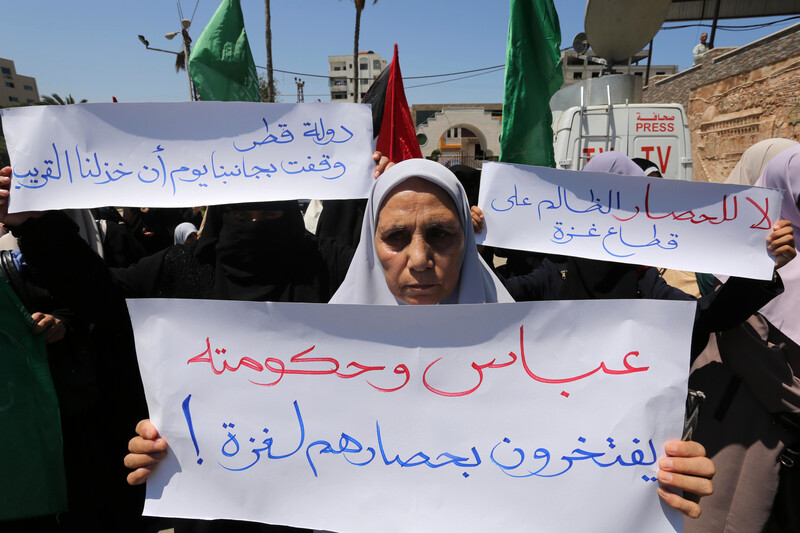Rights and Accountability 19 June 2017

A Palestinian woman at a rally in Gaza City on 18 June carries a sign criticizing PA leader Mahmoud Abbas for supporting Israel’s blockade of Gaza.
APA imagesIsrael reduced its supply of electricity to the occupied Gaza Strip on Monday morning, in spite of warnings from human rights groups that the move violates international law.
The cuts come despite dire warnings in recent weeks from the International Committee of the Red Cross, the World Health Organization and UN officials that the induced electricity shortage is causing a humanitarian catastrophe, as essential health, water and sanitation facilities cannot function.
In mid-May, the ICRC declared that Gaza was on the brink of “systemic collapse.”
Israel plans to eventually reduce its electricity supply to Gaza by 40 percent, according to a plan approved by its cabinet earlier this month.
On Monday, Israel reduced the power supply by about seven percent, which will result in 45 minutes less electricity to Gaza households.
Electricity for most of the two million Palestinians in Gaza is already available for no more than about three or four hours each day.
If the Israeli cuts are fully implemented, Gaza’s population will be left with just two hours of electricity a day.
The cabinet approved the cuts in response to the Palestinian Authority informing Israel that it will pay only 60 percent of Gaza’s monthly electricity bill from Israel.
Israeli Prime Minister Benjamin Netanyahu and defense minister Avigdor Lieberman have maintained that Gaza’s severe electricity shortage is strictly a matter for Palestinians.
“This is an [internal] Palestinian crisis,” Lieberman said. “Those who need to pay for electricity are the leaders of Hamas, of the Palestinian Authority – we are not a party in this.”
Echoing the Israeli government’s claims, UN humanitarian coordinator Robert Piper last week said Gaza’s electricity crisis is the result of a “longstanding internal Palestinian dispute.”
Piper warned, however, that further reductions would be “catastrophic.”
Israel is responsible
But human rights groups reject Israel’s effort to wash its hands of Gaza, insisting that Israel is obliged to maintain the electricity supply regardless of payment.
Human Rights Watch’s director for the region Omar Shakir told the right-wing pro-Israel publication Algemeiner that because Israel is “legally the occupying power,” it must refuse the PA’s request to cut Gaza’s electricity.
“Israel controls the borders, the airspace, the waters of Gaza, so Israel has an obligation that goes beyond merely responding to a request from Palestinian authorities,” Shakir said.
The UN, the ICRC, the United States and the European Union all maintain that under international law Israel remains the occupying power in Gaza, despite Israel’s withdrawal of its soldiers and settlers from the interior of the territory in 2005.
“As the occupying power, Israel has obligations to ensure the basic needs of the civilian population are met,” Magdalena Mughrabi, Amnesty International’s deputy director for the Middle East and North Africa, said last week.
“The Israeli authorities must immediately lift the illegal blockade and end their collective punishment of Gaza’s population,” Mughrabi added.
The spokesperson for the European Union’s foreign affairs chief Federica Mogherini did not respond to a request for comment about the deteriorating situation in Gaza.
Illegal
In a letter to Israel’s attorney general last week, 16 Israeli organizations said that the decision to cut the electricity clearly violates international humanitarian law.
Gisha, a group that monitors the blockade of Gaza, said the letter emphasizes “the illegality of the cabinet’s decision under both Israeli and international law.”
In 2008, the Israeli high court ruled that Israel could minimally reduce the supply of electricity to Gaza for “security” needs. But Israel is not claiming security as a factor now.
The ruling was denounced by human rights groups at the time, but the 16 organizations reminded the attorney general that even the 2008 ruling acknowledges that Gaza is “almost totally dependent on Israel for its supply of electricity,” and that Israel has a “humanitarian obligation” to prevent “harm to the civilian population.”
The 2008 ruling had allowed Israel to reduce its electricity supply by just five percent but required Israel to continue to supply Gaza with enough fuel to operate its power station.
Today, Gaza is even more dependent on Israel for its electricity than it was in 2008. Gaza’s sole power plant no longer operates at all.
The power plant has not operated at full capacity since 2009, when Israel stopped allowing the “humanitarian minimum” of diesel fuel to enter Gaza.
It completely shut down in April after it ran out of emergency fuel supplies paid for by Qatar and Turkey.
While the electricity crisis imposes severe hardships on daily life, it is catastrophic for hospitals, which lack sufficient backup capacity and are already canceling critical surgeries and shutting down entire wings.
A generator powering an intensive care unit at a children’s hospital stopped working three weeks ago because it was overloaded.
Gaza’s health ministry is warning that more than 50 operating rooms that perform around 250 surgeries each day may be closed unless Israel fulfills its obligation to guarantee basic services to the population, including fuel to operate Gaza’s power plant.





